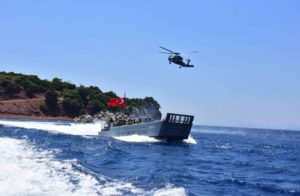Nordic Monitor
Turkish military intelligence asked a judge to block Nordic Monitor’s Twitter account, claiming that an article published by the Swedish-based news outlet could taint the reputation of the Turkish Armed Forces (TSK).
Ankara 3rd Criminal Court of Peace Judge Mustafa Gürbüz granted the request that was filed on March 26, 2021 by the TSK’s General Staff Intelligence Directorate and ordered a block of Nordic Monitor’s Twitter account two days later. The judgment, numbered 2021/4105, was sent for enforcement to Twitter and Internet service providers in Turkey.
The complaint filed by the TSK came after Nordic Monitor had published a classified military document that exposed how the Turkish military listed 131 islands, islets and rock formations in the Aegean Sea whose status was disputed with neighboring Greece and prepared plans to take them over during a conflict.
The secret document, a PowerPoint presentation with 16 slides, included a map with the disputed locations marked. The presentation appears to have been prepared by the War Academies. The secret document was found buried in the annexes of a case file in Izmir.
The judge did not bother hearing arguments from either Twitter or Nordic Monitor and ruled as requested by the Turkish military. The decision to censor a news article is yet another indication of how the the Turkish judiciary has become a tool in the hands of the Islamist government of President Recep Tayyip Erdoğan after a massive purge of more than 4,000 judges and prosecutors on fabricated charges.
The judge’s rubber-stamp order asking Twitter to remove the news article and cut off access to Nordic Monitor’s Twitter account:
The criminal justice system has often been abused by Erdoğan to persecute government critics, leading to the imprisonment of nearly 200 journalists, a world record. Some 180 media outlets critical of the government were seized and shut down in 2016, while many news websites were blocked in Turkey.
Twitter said it would not take any action on the judge’s order to block Nordic Monitor’s account for the time being. Most court orders asking the US-based Twitter to suspend, cancel or block users originate in Turkey.
According to Twitter’s Transparency Report covering the January to June 2020 period, Turkey issued 513 court orders for removal requests in addition to 3,812 other legal demands (orders by police, prosecutors’ offices or regulatory bodies). Twitter said Turkey, which had historically been the highest requester until the previous reporting period, ranked fourth this period with 10 percent of global legal demands. Turkey had 91 percent of all censorship requests in the form of court judgments in the July 1, 2018-Dec. 31, 2018 period.
A slide from secret PowerPoint presentation shows Turkish military plans for islands, islets and rock formations in the Aegean Sea:
Nordic Monitor has previously been hit with similar Turkish court judgments. On January 31, 2019 a court in Ankara ordered a block on Nordic Monitor’s story that exposed how the Turkish judiciary in January 2019 authenticated a leaked voice recording that revealed top Turkish officials debating a plot to stage a false flag incident in order to intervene militarily in Syria.
The decision to block Nordic Monitor’s Twitter thread was made by Judge Ali Keles of the Ankara 2nd Penal Court of Peace a day after the government of President Erdoğan filed a petition to that effect. The judge’s order cited “national security” as justification for his decision, which ordered Twitter to remove or block access to the content.
The article that was referenced on Twitter was titled “Turkish court authenticates audio that revealed spy agency MIT’s false flag in Syria,” published on Nordic Monitor’s website in January 2019. The article reveals how a Turkish court confirmed the authenticity of a leaked audio clip in which top-ranking Turkish officials are heard discussing the possibility of an intervention in Syria in a false flag operation conducted by Turkish intelligence agency MİT .
In the leaked recording then-Foreign Minister Ahmet Davutoğlu, then-Foreign Ministry Undersecretary Feridun Sinirlioğlu, MİT Undersecretary Hakan Fidan and then-Deputy Chief of General Staff Gen. Yaşar Güler are heard discussing military operations in Syria in Davutoğlu’s foreign ministry office on March 13, 2013.

Fidan says in the recording: “If needed, I would dispatch four men to Syria. [Then] I would have them fire eight mortar shells at the Turkish side and create an excuse for war.”
Another incident in which a Turkish judge ordered a block against Nordic Monitor on Twitter took place when Nordic Monitor published an article on systematic failures and troubles with drones that were domestically manufactured by Turkish firm Baykar, whose owners include Selçuk Bayraktar, President Erdoğan’s son-in-law.
The revelations, documented in a classified Turkish military document, were published on May 11, 2019 and exposed how the government covered up problems with the Bayraktar drone system when ground data terminals frequently malfunctioned, with the problem resuming shortly after they returned to service following repair.
Erdoğan’s son-in-law never challenged the documents or the substance of the report, but instead he — through the Turkish president’s lawyer, Ahmet Özel — claimed in his legal complaint with the Istanbul 1st Criminal Court of Peace judge on May 17, 2019 that his rights had been violated.
Judge Mustafa Kolay issued his verdict on the same day under decision No. 2019/3966, agreeing with the plaintiff’s claim that the article contained statements insulting Bayraktar and as such his rights had been violated. The article identifies Erdoğan’s son-in-law only once as the chief technology officer for Baykar, which manufactures the drones.
The Turkish Internet Law was criticized for its shortcomings by the Council of Europe’s Venice Commission, which said in an opinion on June 15, 2016 that the law was not in line with European norms. “The only measure provided for in Law No. 5651 is the measure of access-blocking/removal of content which is the most severe measure possible on the Internet,” the commission emphasized. It added that “[the] Law does not provide for any other measure, less intrusive than blocking/removal, as for instance, requirement of ‘explanation’ from the interested party [content provider, website owner, etc.], ‘response’, ‘correction’, ‘apology’, ‘content renewal’, ‘access renewal’ etc.”












